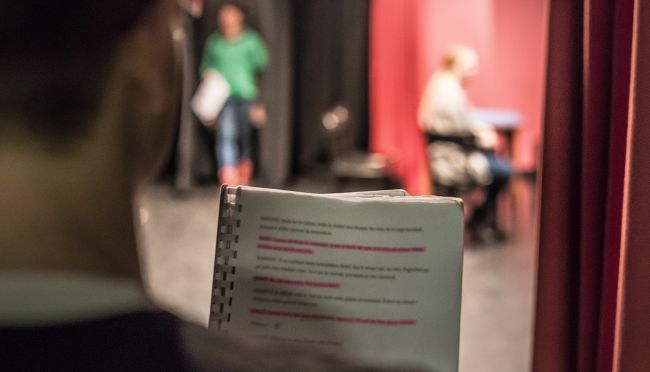Risk and Uncertainty →
→

- 05 Sep 2023
- Book
Thriving After Failing: How to Turn Your Setbacks Into Triumphs
When we slip up, we are often filled with shame, and our instinct is to hide. Instead, people and businesses should applaud smart risk-taking, even when things don't work out, and closely examine their failures to learn from them, says Amy Edmondson.

- 05 Sep 2023
- Book
Failing Well: How Your ‘Intelligent Failure’ Unlocks Your Full Potential
We tend to avoid failure at all costs. But our smarter missteps are worthwhile because they can force us to take a different path that points us toward personal and professional success, says Amy Edmondson.

- 14 Jun 2023
- Research & Ideas
Four Steps to Building the Psychological Safety That High-Performing Teams Need
Struggling to spark strategic risk-taking and creative thinking? In the post-pandemic workplace, teams need psychological safety more than ever, and a new analysis by Amy Edmondson highlights the best ways to nurture it.

- 15 Dec 2020
- Working Paper Summaries
Designing, Not Checking, for Policy Robustness: An Example with Optimal Taxation
The approach used by most economists to check academic research results is flawed for policymaking and evaluation. The authors propose an alternative method for designing economic policy analyses that might be applied to a wide range of economic policies.

- 22 Sep 2020
- Working Paper Summaries
Older People Are Less Pessimistic about the Health Risks of COVID-19
The pandemic presents a unique opportunity to investigate formation of beliefs about an unprecedented, widespread, and life-threatening event. One finding: COVID-19 makes the prospect of disease and death particularly salient for the young.

- 31 Aug 2020
- Working Paper Summaries
The Pass-Through of Uncertainty Shocks to Households
A firm’s stock price volatility during times of uncertainty can significantly reduce workers’ consumption and savings decisions. This paper sheds light on the economic effects of uncertainty, and in particular, how firms provide insurance to their workers during periods of turmoil.

- 02 Apr 2020
- Working Paper Summaries
Strategic Foresight as Dynamic Capability: A New Lens on Knightian Uncertainty
Creating strategy under conditions of uncertainty is not easy, so many managers rely on a single analogy to past experience to guide their decisions. This paper argues, by contrast, that imagining multiple possible futures can be a more useful guide to uncertainty, improving judgment and adaptability in the face of change.

- 02 Apr 2020
- What Do You Think?
What Are Lessons for Leaders from This Black Swan Crisis?
SUMMING UP: Readers of this month's James Heskett post disagree on whether COVID-19 is a Black Swan event, but most argue that organizations must be better prepared for inevitable downturns. Open for comment; 0 Comments.

- 27 Mar 2020
- Working Paper Summaries
Novel Risks
Companies can manage known risks by reducing their likelihood and impact. But such routine risk management often prevents them from recognizing and responding rapidly to novel risks, those not envisioned or seen before. Setting up teams, processes, and capabilities in advance for dealing with unexpected circumstances can protect against their severe consequences.

- 16 Sep 2019
- Research & Ideas
Crowdsourcing Is Helping Hollywood Reduce the Risk of Movie-Making
Hollywood insiders have created "The Black List," which helps surface good but often overlooked scripts. Does the wisdom of the crowd work at the box office? Research by Hong Luo. Open for comment; 0 Comments.

- 21 May 2019
- Working Paper Summaries
rTSR: When Do Relative Performance Metrics Capture Relative Performance?
Managers are increasingly evaluated based on relative performance metrics, particularly relative total shareholder returns (rTSR). This paper finds that the majority of firms that tie CEO performance-based contracts to rTSR do a remarkable job of filtering out the systematic risk in TSR. However, a significant portion of firms make relatively poor choices in the design and selection of rTSR, a result of weak governance and an overreliance on compensation consultants.

- 01 May 2019
- What Do You Think?
What Should the Leadership of YouTube Do?
SUMMING UP Readers comment on how YouTube CEO Susan Wojcicki should solve its “sustainability” versus "respectability" problem. What should YouTube do? asks James Heskett. Open for comment; 0 Comments.

- 20 Feb 2019
- Research & Ideas
Rocket-tunity: Can Private Firms Turn a Profit in Space?
Private rocket companies are competing to be the first to send paying tourists into space, perhaps even this year. Matthew Weinzierl lays out the strategic roadmap to the stars. Open for comment; 0 Comments.

- 04 Feb 2019
- Book
Green Businesses Are Incredibly Difficult to Make Profitable. Try It Anyway
Making a business successful is a challenge in itself, but making a green business profitable is an even harder journey. For society's sake, entrepreneurs must be prepared to make that journey, says Geoffrey Jones. Open for comment; 0 Comments.

- 07 Jan 2019
- Research & Ideas
The Better Way to Forecast the Future
We can forecast hurricane paths with great certainty, yet many businesses can't predict a supply chain snafu just around the corner. Yael Grushka-Cockayne says crowdsourcing can help. Open for comment; 0 Comments.

- 30 Nov 2018
- What Do You Think?
What’s the Best Administrative Approach to Climate Change?
SUMMING UP: James Heskett's readers point to examples of complex environmental problems conquered through multinational cooperation. Can those serve as roadmaps for overcoming global warming? Open for comment; 0 Comments.

- 18 Jun 2018
- Working Paper Summaries
A Measure of Risk Appetite for the Macroeconomy
This paper sheds new light on connections between financial markets and the macroeconomy. It shows that investors’ appetite for risk—revealed by common movements in the pricing of volatile securities—helps determine economic outcomes and real interest rates.

- 21 May 2018
- Working Paper Summaries
Business, Governments, and Political Risk in South Asia and Latin America Since 1970
This study shows how perceptions of political risk by business leaders in emerging markets have differed between regions. For Latin Americans, macroeconomic and policy turbulence were the biggest sources of risk. For South Asians, excessive bureaucracy was the biggest source of risk. The study is based on a unique Harvard Business School oral history database.

- 16 May 2018
- Research & Ideas
How Companies Managed Risk (and Even Benefitted) in World War Internment Camps
Foreign businesses located in at-war countries are often victims of expropriation. Historian Valeria Giacomin explores how German businesses in the United Kingdom and India mitigated risk and even benefitted when their employees were placed in internment camps during the World Wars. Open for comment; 0 Comments.

Struggling With a Big Management Decision? Start by Asking What Really Matters
Leaders must face hard choices, from cutting a budget to adopting a strategy to grow. To make the right call, they should start by following their own “true moral compass,” says Joseph Badaracco.